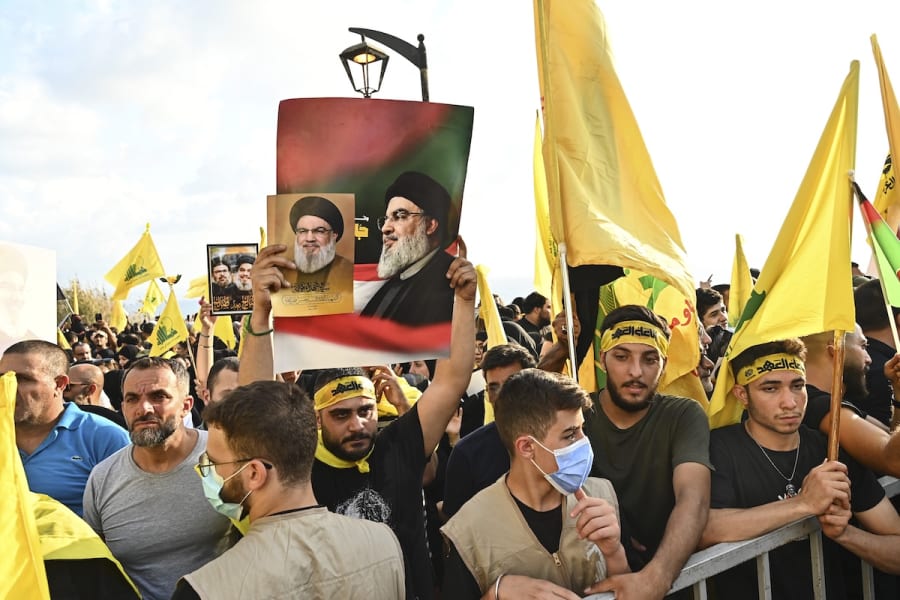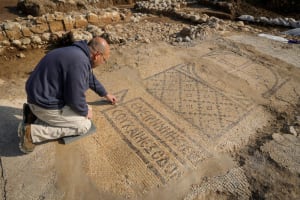Tensions rise in Lebanon amid Hezbollah provocations ahead of first anniversary of leader Nasrallah’s elimination
PM Salam orders arrest of Hezbollah operatives responsible for projecting Nasrallah image onto national symbol

As Lebanon marks a year since Israel killed Hezbollah chief Hassan Nasrallah, tensions between the government and the terror group are intensifying.
Nasrallah's assassination, along with the elimination of his designated successor and most of the group’s leadership, has significantly weakened the terror group, paving the way for the election of a new president whose government is now working to advance efforts to disarm the powerful Iran-backed militia.
However, Hezbollah's new leader, Naim Qassem, has threatened civil war, and no real progress has been made, while Israel continues to strike Hezbollah targets on an almost daily basis since the fighting ended.
This week, Hezbollah has intensified public displays of mourning ahead of an official rally to honor the slain Nasrallah and his designated successor, Hashem Safi al-Din, where Qassem is scheduled to deliver a speech on Saturday.
A senior government official cited by Lebanese media outlets described the situation in the country as “critical,” warning, “We have reached the abyss, and only a miracle can save us.”
Several incidents further ratcheted up tensions this week, including a newly surfaced video showing the massive Israeli strikes on Nasrallah’s bunker that leveled an entire block in Beirut’s Dahiyeh neighborhood and quickly went viral on social media.
A heated debate between supporters and opponents of Hezbollah was ignited on Thursday by a demonstration that projected images of Nasrallah and Safi al-Din on the iconic Raouche rock, a national symbol off the coast of Beirut.
Lebanese Prime Minister Nawaf Salam said he requested the ministers of interior, justice and defense to take “appropriate measures, including arresting the perpetrators and referring them for investigation,” noting that the incident “negatively impacts (Hezbollah's) credibility in dealing with the logic of the state and its institutions.”
Salam had introduced new restrictions on the use of public property and archaeological or tourist sites in an effort to prevent such displays.
The prime minister later said Hezbollah had received a permit for a demonstration which “stipulated that the Raouche rocks shall not be illuminated at all, whether from land, sea, or air, and no light images shall be broadcast on them.”
Parliament Member Waddah al-Sadek criticized Hezbollah’s plans, noting that Nasrallah and Safi al-Din “are not official figures and their pictures will be displayed in a city whose most residents reject their policies, not to mention that some accuse them of taking part in the murder of their leader [ex-PM Rafik Hariri].”
“What’s worse is that their party, as usual, warns against being dragged into a civil war but wastes no chance to provoke Beirut’s residents. We must also not forget that the ‘glorious day’ is still carved in the memory of the Beirutis,” Sadek added, referring to Nasrallah’s description of an armed takeover of parts of the capital in 2008.
However, the terror group ignored the government’s instructions and held a large demonstration on Thursday, including the projections.
Another controversy arose when Hezbollah-affiliated journalists claimed the government, under pressure from Israel and the United States, blocked two Iranian flights carrying people seeking to attend Nasrallah’s commemoration.
Additional tensions were fueled by comments from U.S. Special Envoy Tom Barrack, who remarked earlier this week, “The Lebanese – and I don't mean this in a disrespectful way – all they do is talk,” criticizing the government’s lack of progress on disarmament.
On Thursday, Barrack clarified that Washington “continues to support Lebanon’s endeavor to rebuild its own state, find peace with its neighbors, and continue its quest for resolution of its recently signed cessation of hostilities agreement in November of 2024, including the disarmament of Hezbollah.”

The All Israel News Staff is a team of journalists in Israel.
You might also like to read this:

















